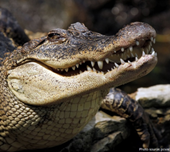    | תנין | qadosh |
 The Modern Hebrew word for a crocodile is תנין (taniyn, Strong’s #8577). This word is also a Biblical Hebrew word and appears twenty-eight times in the Hebrew Bible, including the following verses.
The Modern Hebrew word for a crocodile is תנין (taniyn, Strong’s #8577). This word is also a Biblical Hebrew word and appears twenty-eight times in the Hebrew Bible, including the following verses.
When Pharaoh shall speak unto you, saying, Shew a miracle for you: then thou shalt say unto Aaron, Take thy rod, and cast it before Pharaoh, and it shall become a serpent (taniyn). (KJV, Exodus 7:9)
And Moses and Aaron went in unto Pharaoh, and they did so as the LORD had commanded: and Aaron cast down his rod before Pharaoh, and before his servants, and it became a serpent (taniyn). (KJV, Exodus 7:10)
Is it possible that Moses’ staff turned into a crocodile instead of a serpent? Yes, I believe so. The usual Hebrew word for a serpent is נחש (nahhash, Strong’s #5175) and this is the word used in these two verses.
And he said, Cast it on the ground. And he cast it on the ground, and it became a serpent (nahhash); and Moses fled from before it. (KJV, Exodus 4:3)
Get thee unto Pharaoh in the morning; lo, he goeth out unto the water; and thou shalt stand by the river's brink against he come; and the rod which was turned to a serpent (nahhash) shalt thou take in thine hand. (KJV, Exodus 7:15)
According to these verses, Moses’ staff turned into a taniyn (7:9,10), but it is also called a nahhash (4:3, 7:15). I am of the opinion that the Hebrew word nahhash means “reptile,” which could be a serpent or a crocodile. This leaves us with the word taniyn. In Genesis 1:21 the taniyn, translated as “whale” in the KJV, appears to live in the water, but in Psalm 91:13 the taniyn, translated as “dragon” in the KJV, appears to live on the land.
While there are some serpents that do swim in the water, they are predominately a land animal. The crocodile however, is at home in the water and the land.


